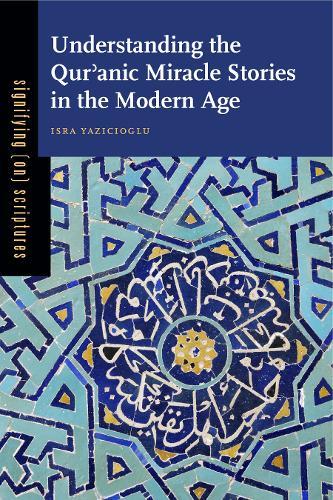Full Product Details
Author: Isra Yazicioglu (St. Joseph's University)
Publisher: Pennsylvania State University Press
Imprint: Pennsylvania State University Press
Volume: 3
Dimensions:
Width: 15.20cm
, Height: 1.60cm
, Length: 22.90cm
Weight: 0.386kg
ISBN: 9780271061573
ISBN 10: 027106157
Pages: 232
Publication Date: 15 October 2015
Audience:
Professional and scholarly
,
Professional & Vocational
Format: Paperback
Publisher's Status: Active
Availability: Manufactured on demand

We will order this item for you from a manufactured on demand supplier.
Reviews
“A significant contribution to our understanding of how and what scriptures signify.” —David L. Weddle Journal of Qurʾanic Studies “Yazicioglu’s monograph should and will be taken, in the years to come, as a reference point hard to be ignored in the interreligious and intercultural debate over the reconciliation of faith and science.” —Stefano Bigliardi Social Epistemology Review and Reply Collective “An intriguing study not only of the Qurʾan but also of the reception history of the sacred text in light of the challenge of rationalism. Isra Yazicioglu's work serves as a useful reminder of how intellectual trends in each era have shaped our interaction with divine revelation in a way that is timeless—and also timely.” —Omid Safi, University of North Carolina at Chapel Hill “An important book that brings miracle stories from Islam into conversation with philosophy. Isra Yazicioglu takes us on a journey through Ghazali’s defense of miracle stories—and she reframes those stories in terms of modern philosophy, beginning with Hume, developing with Peirce (who reminds us that natural laws are not absolute but who nevertheless recognizes regularities in nature), and ending with Nursi (for whom miracles invite us to rethink our assumptions about natural causation).” —Gavin Flood, University of Oxford “A lucidly written volume from which students of philosophy and theology as well as the informed general reader can benefit.” —Mushegh Asatryan International Bulletin of Missionary Research “A most worthy and timely project, deftly executed and providing a valuable resource to anyone interested in how a range of philosophers, mediaeval and modern, have approached the miraculous.” —Damian Howard S.J. Islam and Christian-Muslim Relations
This is an important book that brings miracle stories from Islam into conversation with philosophy. Isra Yazicioglu takes us on a journey through al-Ghazali s defense of miracle stories and she reframes those stories in terms of modern philosophy, beginning with Hume, developing with Peirce (who reminds us that natural laws are not absolute but who nevertheless recognizes regularities in nature), and ending with Nursi (for whom miracles invite us to rethink our assumptions about natural causation). Yazicioglu's pragmatic hermeneutics raises highly relevant philosophical questions and makes us rethink our assumptions about Qur anic miracle stories, showing how we must read them as relevant scriptural texts that question our assumptions about the world. This is a well-written and engaging book on an important topic. It deserves to be widely read and discussed. Gavin Flood, University of Oxford
A most worthy and timely project, deftly executed and providing a valuable resource to anyone interested in how a range of philosophers, mediaeval and modern, have approached the miraculous. --Damian Howard S.J., Islam and Christian-Muslim Relations A lucidly written volume from which students of philosophy and theology as well as the informed general reader can benefit. --Mushegh Asatryan, International Bulletin of Missionary Research An important book that brings miracle stories from Islam into conversation with philosophy. Isra Yazicioglu takes us on a journey through Ghazali's defense of miracle stories--and she reframes those stories in terms of modern philosophy, beginning with Hume, developing with Peirce (who reminds us that natural laws are not absolute but who nevertheless recognizes regularities in nature), and ending with Nursi (for whom miracles invite us to rethink our assumptions about natural causation). --Gavin Flood, University of Oxford An intriguing study not only of the Qur'an but also of the reception history of the sacred text in light of the challenge of rationalism. Isra Yazicioglu's work serves as a useful reminder of how intellectual trends in each era have shaped our interaction with divine revelation in a way that is timeless--and also timely. --Omid Safi, University of North Carolina at Chapel Hill Yazicioglu's monograph should and will be taken, in the years to come, as a reference point hard to be ignored in the interreligious and intercultural debate over the reconciliation of faith and science. --Stefano Bigliardi, Social Epistemology Review and Reply Collective A significant contribution to our understanding of how and what scriptures signify. --David L. Weddle, Journal of Qur'anic Studies
A most worthy and timely project, deftly executed and providing a valuable resource to anyone interested in how a range of philosophers, mediaeval and modern, have approached the miraculous. </p>--Damian Howard S.J., <em>Islam and Christian-Muslim Relations</em></p>
Author Information
Isra Yazicioglu is Assistant Professor of Theology and Religious Studies at St. Joseph’s University.




